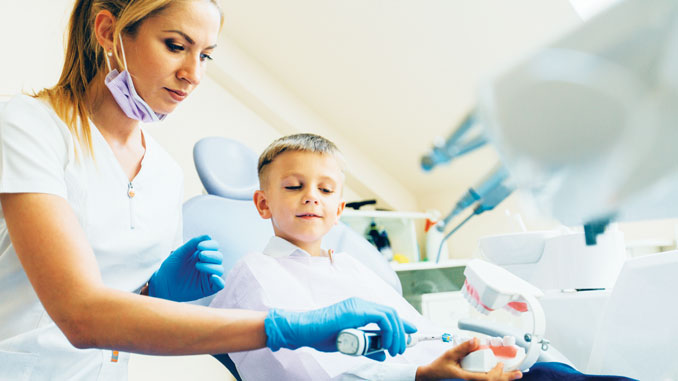
Lessons in dental care are passed from generation to generation.
Your habits and the ideals you instill in your child about dental health will stay with them for a lifetime. Set your child up for a forever of healthy smiles by starting dental care as early as pregnancy. It’s never too late to adopt healthy practices and the earlier good oral habits are taught the more likely they are to have a lasting impact on children.
In the Womb/Infancy
A child’s dental health begins far before the appearance of their first tooth. In fact, healthy habits in utero have an effect on lifelong dental health.
A baby’s teeth begin to develop as early as month three of pregnancy, which means the habits you adopt while pregnant affect your child’s future smile. Rule number one is to eat a healthy, well-balanced diet. When it comes to pregnancy, what you put into your body has the greatest affect on your baby’s health; and while many nutrients are important during pregnancy, vitamins A, C, and D, protein, calcium, and phosphorous have all been linked to the development of healthy mouths.
Doctors suggest that pregnant women fill their plates with plenty of fruits and vegetables, grains, and lean proteins. Foods low in sugar and high in folic acid, such as leafy, green vegetables, are best.
Supplements are another important part of pregnancy. Prenatal vitamins contain more folic acid to lower the risk of birth defects. Calcium is also important, as it helps create strong bones (and teeth are bones after all!)
Children are typically born without teeth and for many parents it’s out of sight, out of mind. Oral care, even without the presence of teeth, is important.
A baby’s gums should be wiped down after feedings with a washcloth. Non-bristle toothbrushes can be used to massage gums for both teething pain relief and as a way of keeping the mouth clean. As soon as that first tooth erupts, start brushing it. And follow the American Academy of Pediatrics’ suggestions for dental visits by scheduling an appointment around your child’s first birthday, or six months after the first tooth appears. A full appointment, with x-rays and a tooth cleaning, will typically come around age 3.
Oral Genetics
When it comes to genetics, how straight teeth are and the position of wisdom teeth may come from mom and dad, but the myth that “soft teeth,” when enamel is worn down, is genetic holds no truth. Enamel is actually worn by acid on teeth, which can be prevented with good diet and teeth cleaning habits. However, some families are more prone to the development of unhealthy bacteria that causes cavities. If that’s the case, more aggressive oral care throughout a child’s life may be necessary.
Baby Bottle Tooth Decay
Baby Bottle Tooth Decay is the name for tooth decay found in infants and toddlers, and it’s called that because of the connection between baby bottles and early childhood caries. Going to bed with a bottle filled with milk or juice can be detrimental to a young child’s oral health. These drinks contain sugar that sits on the child’s teeth all night, turning into bacteria that leads to tooth decay. Don’t let bottle soothing and in-crib feedings become a habit (even if you’re just trying to catch a few extra zzz’s). For prevention, always wipe your child’s teeth after a feeding and only send them to bed with water.
Early Childhood
Most good hygiene habits are formed in early childhood. What you model for your children at an early age will form their routines and personal care into adulthood.
There are two main ways to ensure healthy lifelong dental habits. The first is to model good oral hygiene behavior, such as brushing and flossing often in front of your children, avoiding sugary foods and snacks that cause nasty tooth decay, and visiting the dentist on schedule. Even without a conversation about it, children will understand the importance of dental health because you demonstrate it’s a priority. “An engaged parental role is crucial to a child’s dental health,” says Jeff McComb, DDS, Pediatrics Dental Director at Kids Care Dental & Orthodontics. “We as your dental team typically only see your child(ren) twice per calendar year unless they need additional care. We can and should provide sound clinical advice and practical feedback to equip you and your child to achieve dental health. However, we can never be a replacement for an involved parent at home.” The second step is to get your child into a healthy dental routine of his or her own. This includes regular dental visits every six months, brushing your child’s teeth twice each day—once in the morning and once at night—and flossing daily.
There are a lot of reasons these early practices work for long-term dental care. First off, all habits formed early are more likely to last a lifetime. Secondly, tooth decay and other dental issues are harder to reverse (though it is possible in many cases) than to avoid in the first place.
A staggering 96 percent of adults will experience tooth decay in their lifetime, and 42 percent of 2-11 year olds will have dental caries in baby teeth. That’s double the amount of children ages 6-11 with the same issues in their permanent teeth.
“Flossing is huge! Please floss teeth as soon as you see two teeth that touch. If you don’t floss, 35 percent of the tooth surface doesn’t get cleaned,” says Dr. Anisha Ranchhod, owner and pediatric dentist at Lodi Kids.
Parents need to ditch the mentality that baby teeth don’t matter. “Although baby teeth will eventually fall out, they are important for maintaining proper dental health for incoming permanent teeth,” says Dr. Rafat S. Razi, a pediatric dentist in Tracy. Even though the teeth will eventually fall out and be replaced with permanent adult teeth, the damage done can spread to the gums and other areas of the mouth. Well cared for primary teeth make way for healthier, straighter adult teeth to come in. And don’t forget those baby molars stay in place until 10-12 years old. Not to mention those nasty habits that caused the tooth decay in the first place—infrequent brushing and too many sugary juices and snacks—have already been cemented into your child’s mind as appropriate oral care.
“Despite all our advances with technology, safer digital x-rays and other preventative products, early tooth decay still remains very prevalent in our community,” Dr. Ranchhod says. “Starting early with brushing and flossing and maintaining a healthy diet can help prevent this.”
Dr. Razi’s Tips for Healthy Baby Teeth
After baby’s teeth are present, do not send them to bed with bottles or sippy cups containing anything but water.
Schedule your child’s first dental check-up no later than the child’s first birthday or six months after the eruption of the first tooth, whichever comes first.
Parents must brush and floss for their child. Children do not have the manual dexterity to brush properly until about age 6 and floss till about age 8.
Eat healthy snacks such as fruits and vegetables and limit soda, candy, and juices to once a week as a treat.
Pre-teens/Teenagers
At every age diet is the cornerstone for a healthy mouth. Eating nutritious foods that are low in sugar help prevent cavity-causing bacteria. Brushing after each meal, or at least twice per day, is key to removing the bacteria before it builds up and creates a toxic environment. Flossing removes buildup between teeth and in hard-to-reach places.
Around this time, orthodontia will come into play, as well. It is important to visit an orthodontist early and make a proper plan for your children’s teeth. Straight teeth are good for more than just aesthetics. They contribute to a proper bite and are easier to keep clean. When teeth are crooked or misaligned, additional issues requiring surgery can arise.
This is also the time in a child’s life when wisdom tooth removal should be considered. There is no one-size-fits-all approach, but if your child is getting routine care, you’ll know what to do and when to do it.
At this stage of the game, staying on top of a child’s dental care with biannual cleanings and checkups is key. X-rays help dentists diagnose problems before they get too complicated and address issues with improper oral care before devastation.
Confidence Boost
The preteen and teenage years are delicate. Appearances often become more important and many children struggle with confidence. A good-looking smile provides a major mood boost for many. Caring for your child’s teeth is important for their overall health, as oral issues have been linked to cardiovascular disease and more. However, aesthetics can also make a difference. If it’s within your means, consider asking your child what they want. Teeth whitening, braces or Invisalign, and other procedures to fix damaged or abnormal teeth can have a positive, lasting effect on children, even if the reasons are not rooted in oral health.

